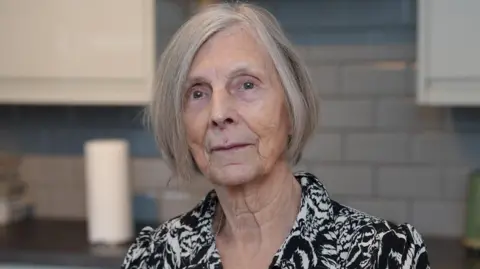 BBC
BBCAn 81-year-old grandma has told the BBC she hopes to live long enough to get her autistic grandson out of the hospital where he has been stuck for two years.
Dorothy Lafferty said doctors had long ago agreed that 28-year-old Andrew did not need hospital treatment but there was no suitable place for him to go.
He needs a care team and a quiet home because loud environments make his anxiety worse.
New figures due to be published later are expected to show there has been an increase in the number of people with learning difficulties and autism being stuck in hospital or inappropriately placed away from home.
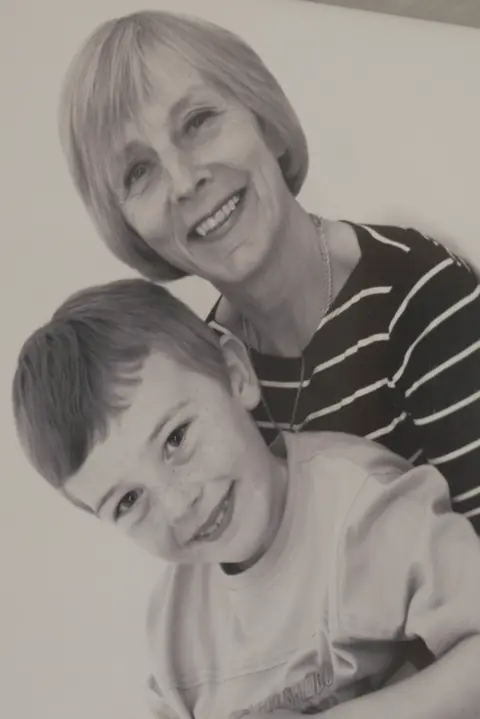 Dorothy Lafferty
Dorothy LaffertyThey started collecting the numbers and the first dynamic funding register was published a year ago.
It found 1,243 people were in hospital, far from home or at risk of housing failure.
By June 2024, this number has not decreased but has increased to 1,515.
Andrew has been in a 20-bed adult psychiatric ward at Stobhill Hospital in Glasgow for two and a half years.
In two of those years he was recorded as a late leaver and should have been released home – but there is no suitable home for him to go to.
His “Nana” Dorothy has looked after Andrew since he was two years old, when his mother needed help coping with brain cancer.
His mother died of cancer when he was 12, and Andrew became extremely anxious and struggled to cope.
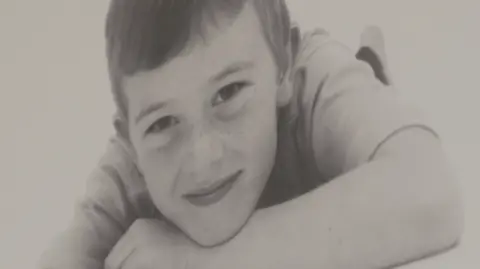 Dorothy Lafferty
Dorothy LaffertyDorothy, from Bishopbriggs in East Dunbartonshire, said Andrew went to a mainstream school and was doing well, but the loss of his mother had left him disturbed.
She says he can’t understand how someone he prayed for died.
After leaving school, he struggled with internships and apartments because they were too noisy for him.
When his symptoms became more severe he was then admitted to a psychiatric ward, but two years ago it was determined that he could be released with the right support.
Like hundreds of others with learning difficulties or autism who are stuck in wards or hospitals, he still has nowhere to live.
Experts point out that there is a lack of suitable housing and care staff and sometimes a failure to prioritize people behind closed doors.
In a statement to the BBC, Andrew wrote: “I would like to have my own place where there aren’t a lot of people.”
He said he was afraid to leave the hospital because he had been there for so long.
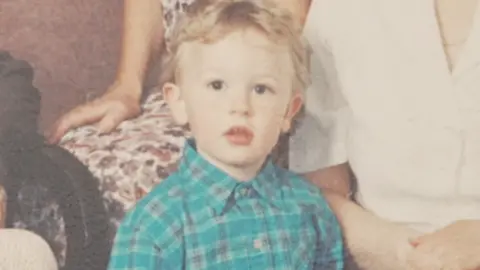 Dorothy Lafferty
Dorothy LaffertyBecause of his autism, he has difficulty eating hospital food and is often too anxious to sit with others in the dining room.
His grandma regularly makes him tuna fish sandwiches and brings them to him at the hospital.
Dorothy says Andrew finds many situations too stressful and worries about who will look after him when she’s gone.
“I always think that at 81, I’m so lucky to be the way I am,” she said
“I can be on the go and that’s a big plus for me.”
“If I can keep it up until I see Andrew out there, I’ll feel like I’ve accomplished something in life.”
Andrew has a care team on site but no home to go to.
Dorothy says she spent hours in the library looking for accommodations and attended dozens of meetings, but there was no progress.
She says she and Andrew are very worried about what will happen next.
“Last week he said to me, ‘Nana, is there any chance you can live until you’re 100?'”
When Dorothy told him that not many people live that long, he said, “I’ll feel like my life is over if something happens to you because I depend on you so much.”
“I can’t imagine what life would be like without you.”
Dorothy said: “I want to live long enough to see Andrew settle down. That is my only goal in life. That’s all I want.”
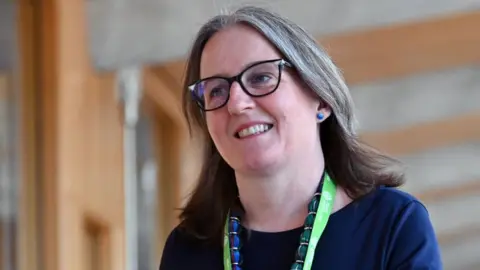 Getty Images
Getty ImagesThe dynamic support register, which monitors how many patients are in unsuitable accommodation, should be accompanied by a national oversight body.
This was intended to hold local authorities and health and social partnerships to account, but this never happened.
Government advisor Dr. Anne Macdonald said not enough progress had been made and that the system was “failing” people with complex support needs.
“People have the right to live in their local community, to live close to family and friends and to lead a normal life as we would all wish,” she said.
“Those with complex support needs, who are currently stuck in hospital or living in inadequate, remote accommodation hundreds of miles from home – we are not doing enough for these people and I would even say we are failing them and their families .”
The Scottish Government said in 2013 that within five years, people with learning disabilities, autism and complex care needs who were in institutions outside Scotland should be supported to live closer to their family in Scotland.
The policy to move people out of institutional care and closer to family follows decades of promises to move people with learning disabilities out of large hospital settings and into the community – but some appear to have become stuck in the system.
“Very disappointing” progress
Social Services Minister Maree Todd said she was “very disappointed at the slow progress” being made.
“The Coming Home report told us that we needed to do some things in central government and we have pretty much completed those things,” she told the BBC.
“We created the dynamic support register, which gives us a really good overview of the data. We now know who is in the system and where they are, and that informs local authorities and local health departments.”
“But we have not made any progress in bringing the numbers down and that is very disappointing to me.”
Derrick Pearce, chief executive of the East Dunbartonshire Health and Social Care Partnership (HSCP), which is handling Andrew’s case, said it supported a wide range of social care provision in the local community.
“However, there are times when identifying a care facility that can successfully meet complex care needs may take longer than we would like to ensure successful long-term hospital discharge,” he said.
“In all cases, including Andrew, a comprehensive multidisciplinary assessment and care planning is carried out, taking into account both medical and social support models, to establish a tailored care model in collaboration with family and carers.”
“By continuing to work closely together, we hope to create a person-centered care plan while identifying appropriate accommodations based on specific housing and health needs, while ensuring and ensuring the success of these plans to enable safe and independent living in the community .”

